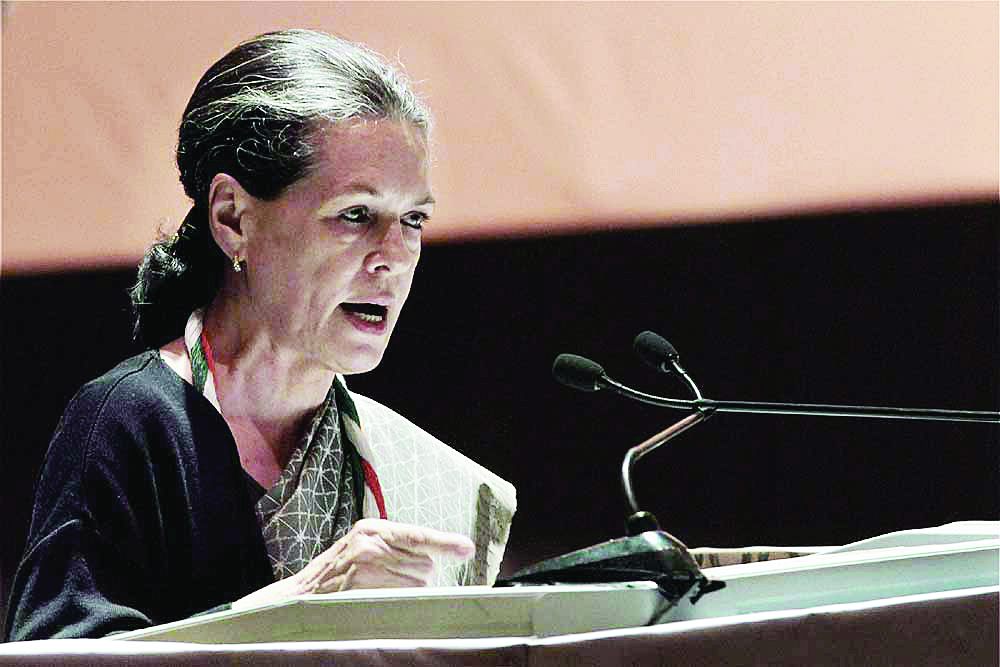With the promulgation of the ordinance on Right to Food, the Congress strategy for the 2014 general elections is beginning to take shape. It appears to be based on three things: populism, communalism and regionalism. That is, introducing populist programmes, deflecting public attention away from the economy by bringing into focus the 2002 communal riots and in Andhra Pradesh, wooing pro-Telengana factions and rebels.
The monsoon session of parliament is just a few weeks away, so why did the UPA government bring the ordinance instead of allowing the national food security bill to be debated and passed in parliament? The pre-emptive move appears to have been based, not on a decision to go in for a snap poll, but on the assessment of Congress president Sonia Gandhi's advisers that the BJP would not allow parliament to function.
The opposition is expected to take up the coal block allocation scam aggressively to focus public attention on the UPA II's series of scandals, both inside and outside parliament. As a result, the food bill would take a back seat.
Since the Congress is pinning its hopes on cash transfer of food subsidy in order to come back to power in 2014, passing the food bill is a necessity. Of course, the food ordinance must be ratified in the winter session of parliament, otherwise it will lapse. The Congress hopes that in the next six months, the mechanism for cash transfer will be in place. Once it is working and the beneficiaries are actually getting cash in hand, it will become hard for the opposition to scuttle the bill.
In the face of this logic, even the opponents of the food ordinance within the Congress and the UPA, have been silenced. But privately, they are still sceptical. The impact of the ordinance on the economy has yet to be predicted. It is obvious that it will impose a heavy subsidy burden, but no one is sure of the exact figure.
Dr Ashok Gulati, who heads the commission of agricultural costs and prices (CACP) and is much reviled by the pro-food bill lobby, predicts it may cost Rs 6.5 lakh crore over three years! The government says it will only cost Rs 1.25 lakh crore per year (according to the FCI website, subsidy incurred on food in 2012-13 was Rs 82,000 crore). The total agriculture subsidy is bound to increase even more, due to the recent doubling of natural gas prices. Natural gas is a key input in the manufacture of urea, so this means a sharp increase in the manufacturing cost of fertilizers and this in turn, will push up the fertilizer subsidy.
Prices of food grains in the open market may also go up, as higher procurement and storage by the central and state governments may lead to a supply squeeze. As state governments are now including pulses and oils in the public distribution system (PDS), imports of these items are also likely to increase.
Critics of cash transfer of food subsidy say that due to social reasons like gender inequality, the money may be diverted to non-food items like alcohol. Thus, there are many unresolved doubts about the food ordinance but Sonia was determined to go through with it. She is clearly convinced that along with MNREGA and the Right to Information Act, it will make the UPA regime a historic one.
The second part of the Congress strategy is to subvert Gujarat chief minister Narendra Modi's attempt to acquire a pluralist image. Through the Ishrat Jahan encounter killing case, it seeks to remind the nation that the man who speaks the language of development and is seen as a model of good governance is the same one who presided over the 2002 Gujarat riots. Congress strategists feel this will polarise the minority and liberal votes, to the party's advantage.
The third and critical component of its strategy is to tackle the long festering problem of Telangana. Sonia's advisers have told her that the party's tally in Andhra Pradesh may come down from 33 to three unless there is some movement on Telangana. Also, she needs to mend fences with YSR Congress chief Jagan Mohan Reddy, who has been in jail for over a year. His family has already held out an olive branch to the Congress but the CBI is relentless in its pursuit of the disproportionate assets case against him.
The anti-Telangana lobby in the Congress has suggested giving Andhra Pradesh a chief minister from Telangana or setting up an autonomous council to sooth the sentiments of people from the region. But majority of MPs from the state say this will be too little, too late. In May, three Congress MPs resigned to join the Telangana Rashtra Samiti.
Critical policy initiatives like Telangana and the food bill, which have far-reaching economic, social and political consequences, should not be prompted by electoral considerations. But staying in power seems to have become the prime driver for the political establishment in our democracy.

